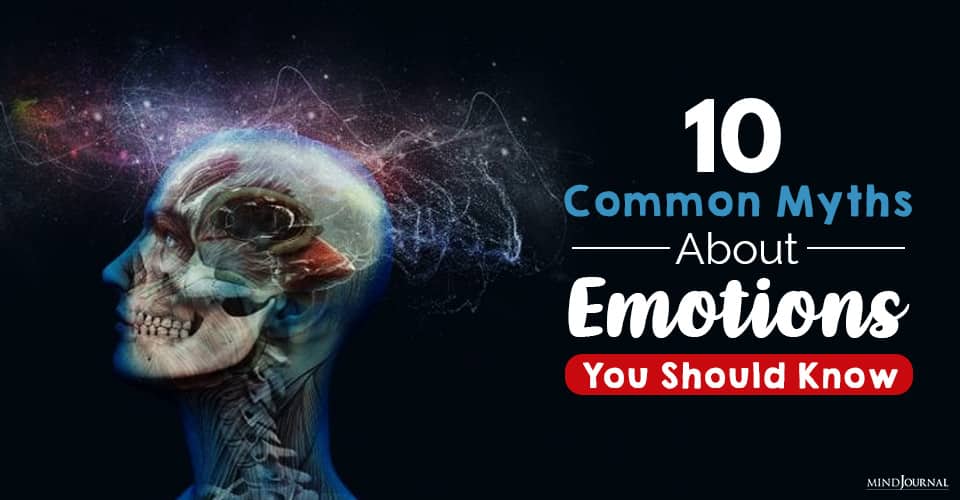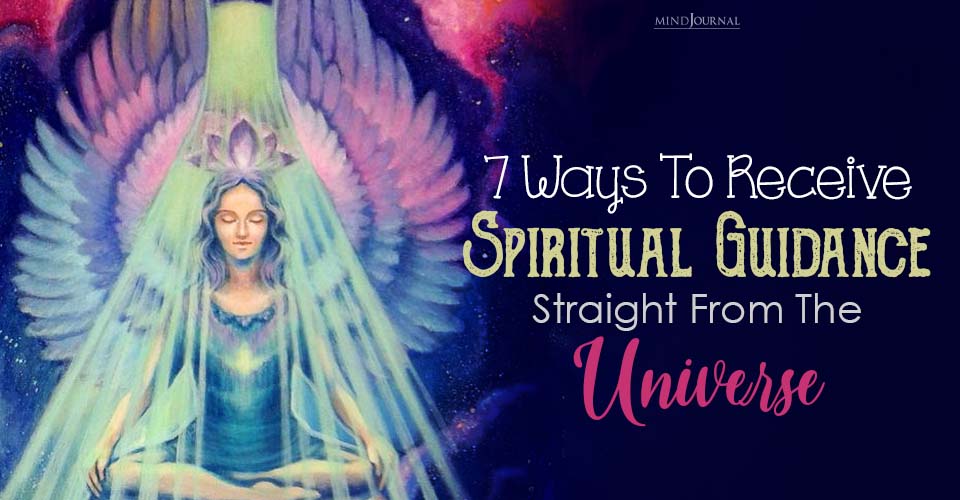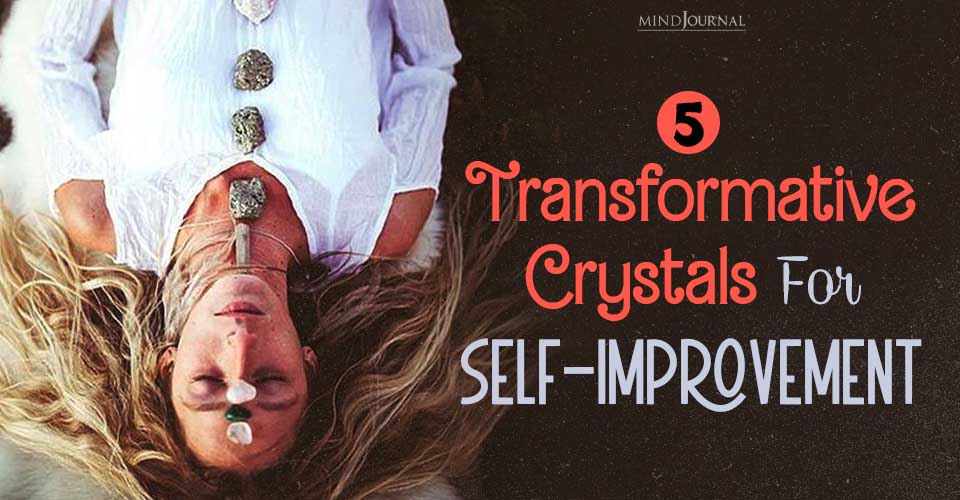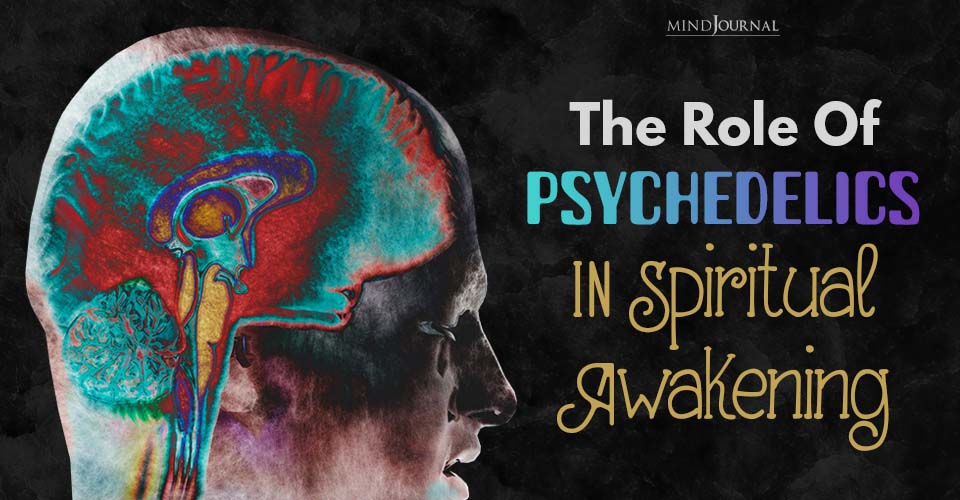Human emotions are a complex thing, and understanding their complexity is not as easy as they may seem. Human emotions are a vast and very, very intriguing concept, and understandably there are many common myths surrounding them. The general consensus might not always align with the real truth of it.
No matter how different you are from everyone else, emotions are what makes you human, yet, it’s probably the one thing that you have the most trouble comprehending. Now the million-dollar question is that if you don’t understand your own emotions, then how can you ever expect to feel them in all their glory? How will you understand what they are trying to tell you?
Here Are The 10 Common Myths About Emotions You Should Know
1. Not being able to control what you feel.
When you feel something, you are feeling a sense of judgment, i.e. your emotional response and experience is a result of how YOU are interpreting the event, rather than how it actually is. The interesting thing is your beliefs might not always be accurate and spot-on.
Different people interpret and react to something differently; it might be the same situation, but not everyone is going to judge it in the same way. For example, when someone dies it causes grief to someone, and that signifies that the dead person was important to them, but someone else might not feel the same way. If a situation is outrageous to someone, it means they perceive it like that. If there is no sort of appraisal to an event, it signifies that there is zero emotion.
Without examining the psychology behind someone’s thinking and why they react to something the way they do, it is not possible to know the truth. It’s not a surprise that cognitive-behavioral therapy is based on the notion that emotional pain is a result of irrational or distorted thinking.
Related: How to Understand your Emotions Better and Be More in Touch with Them
2. It’s impossible to express emotions in words.
No, it’s really not impossible to express your emotions in words. While it may be true that human language is not evolved enough for an “inner experience”, that does not mean emotions can never be described.
As explained above, emotions are basically judgment, and that makes it possible to analyze and describe them in fair detail. Kids are frequently asked to express how they feel when they are emotional, sad, angry or upset, by their teachers and parents. Studies have shown that expressing fear and anger, instead of bottling them up can tremendously help with self-control.
The moment you put your feelings into words, your brain’s control system (inhibition) gets activated, and accordingly decreases your emotional reactions.
3. Emotions and feelings are the same thing.
Noted neuroscientist Antonio Damasio believes that feelings are a kind of bodily experience caused by an emotional response. Feelings and any kind of emotional reactions require a certain level of awareness, i.e. they are not just intellectual, as they get registered in human consciousness.
If emotions are perceived as simply bodily feelings, then there would be no scope for reflection; what you feel is just a tiny part of the picture, and is not the whole picture in itself.
4. The hydraulic metaphor.
Just like the suggested metaphor, whenever you stop yourself from expressing your emotions, they end up dripping somewhere else. That’s why it is crucial for you to never bottle your feelings up, and instead, openly express them to feel better. Whenever your emotions are ‘simmering’, ‘heating up’ or you are ‘bottling them up’, you are exhibiting passivity.
When it comes to emotional regulation, there are many ways with the help of which unsuitable emotional experiences and reactions can be handled, with distraction and reinterpretation being two of them. For example, many people look towards humor to defuse an angry and emotionally volatile situation.
Related: 15 Art Therapy Exercises to Control Your Mind and Channel Your Emotions
5. Knowing exactly how someone else’s actions upset you.
You might think that you are always right about your emotions and your emotional reactions, but the truth is everyone at some point is wrong about it. It’s very common to misname and misread your emotions, even if you are convinced otherwise. This leads to you misreading and misunderstanding someone else’s emotions too, especially when your perception is overshadowed by your own prejudices and personal opinions.
For example, in the case of a high-profile divorce, most of the time the woman is termed as a gold-digger who is after her husband’s money. But the truth might be entirely different. Maybe she was in an abusive relationship, or maybe she has to look after her children, and maybe you think like this because you might have been financially exploited by your partner at some point.
In such cases, one of the best things you can do is acknowledge that maybe your negative emotional reactions are stemming from a place of fear, hurt, sadness and pain. The moment you realize this your misattributed emotions will disappear, and you will see things the way they really are.
6. Emotions are meaningless and foolish.
Contrary to what most people think, reason/logic and emotion are not competing with each other all the time, rather they are complementary forces that influence and interact with each other. Emotion is actually an important part of reasoning, and if there is a lack of it, it can prove to be harmful for decision-making. For example, autistic children don’t have the ability to comprehend others’ motivations, emotions and feelings.
If you are looking to make an informed and intelligent decision, you need to rely on both, reason and emotions. Your emotional reactions present to you a summary of your past experiences and how you perceived them, and this, in turn, helps you (gut instinct) to make informed and efficient decisions. It’s not just about what you should do, it’s equally important to feel it within you.
7. Emotions are illogical.
Your rationality expands your well-being, and as long as your emotions are rational, you can work positively towards your personal and collective well-being. For instance, jealousy is an illogical emotion, because, at the heart of it, there is a dissatisfied comparison (she has that, but I don’t). No wonder it is one of the ‘7 deadly sins’.
Grieving the death of a loved one is a logical feeling. Experiencing a guilty conscience is one of those emotions that push you to consider the interests of others, and feel concerned about them. But then again, love can be considered as an illogical feeling when you choose to go after someone you can never have, and driving yourself mad in the hope that you will achieve the impossible, like for instance, being in love with a married man, and expecting him to leave his family for you.
Related: How To Fully Release Difficult Emotions That Hold You Back
8. “I don’t control emotions, it controls me.”
Contrary to popular belief, your emotions don’t always control you, rather you CAN control your emotions. When you feel like you can’t at all, it’s because you have practiced this behavior pattern over and over again in the past, and now you are having difficulty breaking it. For example, you might believe that the only way to get someone to do something is to intimidate them, but you can also achieve this by asking them nicely.
Some might give into alcohol abuse for dealing with their painful emotions, but they can deal with their pain by relying on healthy modes of expression. Emotions work the way you want them to work, not the other way round.
9. Believing that you will always feel the same.
Most of the time quintessential emotions are ephemeral, and how you feel today, you are not going to feel like that forever. A normal emotional response escalates quickly, but then with time, slowly decays.
For instance, you might be seething with anger, but this anger of yours won’t last for more than a few hours, at most. You are not going to feel angry for the rest of your life. Negative and painful emotions are temporary, and the more you understand that the better you will be able to regulate your emotional responses. There’s no point beating yourself up constantly for something temporary.
10. Emotional moods can’t be altered.
Many studies have shown that the facial expressions of emotions that you adopt, lead to you feeling the same way. In other words, fake it till you make it. When you have a proud expression on your face, you feel determined and driven, as projecting a sense of pride pushes you to work harder.
When you speak in a sad and dejected tone, you automatically feel sad and dejected. When you put a smile on your face, you feel happier on the inside. How you elevate yourself on the outside, can sometimes influence how you feel on the inside.
Related: 4 Ways To Cope With Negative Emotions
The bottom line is, if you constantly think that your emotions are entirely out of your control, and there is no way you can regulate them on your own, you will end up accepting negative behavior, which can otherwise be easily controlled. The moment you take responsibility for your own feelings, you stop feeling like a victim who has been held hostage by their emotions.










Leave a Reply